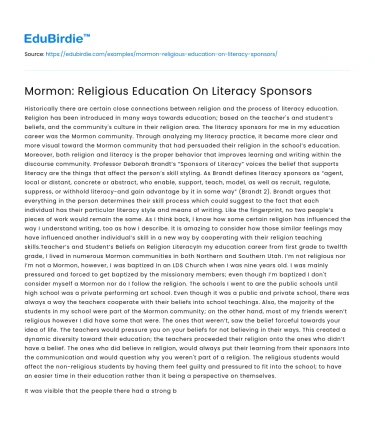Introduction
The Church of Jesus Christ of Latter-day Saints, commonly known as the Mormon Church, has long been recognized for its emphasis on education, particularly in the context of literacy. This focus on literacy is not solely a means to an end but is deeply embedded within the religious and cultural fabric of the organization. The Church's commitment to literacy can be traced back to its early leaders, who saw education as a divine mandate. As a result, religious education within Mormonism serves as a potent literacy sponsor, fostering a culture of learning and intellectual engagement. This essay seeks to explore the mechanisms through which Mormon religious education acts as a literacy sponsor, examining its historical roots, contemporary practices, and the challenges it faces in an ever-evolving educational landscape.
Historical Foundations of Literacy in Mormonism
The origins of Mormonism's investment in literacy can be traced back to its founding in the early 19th century. Joseph Smith, the Church's founder, emphasized the importance of education as a means of spiritual and temporal salvation. The establishment of the School of the Prophets in 1833 exemplified this commitment, serving as a venue for religious and secular instruction. According to historian Richard L. Bushman, "Smith viewed education as a means to empower his followers not only spiritually but also intellectually." This dual focus on spiritual and intellectual development became a cornerstone of the Church's educational philosophy.
The Church's emphasis on literacy was further reinforced with the publication of the Book of Mormon, which necessitated a literate congregation to engage with its teachings. The imperative to read and comprehend sacred texts elevated literacy from a mere skill to a religious obligation. This perspective is echoed in the words of Brigham Young, who asserted that "the glory of God is intelligence," thus linking literacy to divine understanding. Consequently, literacy became a marker of faithfulness and devotion, with Church leaders actively promoting educational initiatives to ensure widespread literacy among members.
The early establishment of educational institutions, such as Brigham Young University, underscored the Church's commitment to literacy as a means of personal and communal advancement. These historical foundations laid the groundwork for a robust culture of literacy sponsorship that continues to permeate Mormon religious education today.
Contemporary Practices in Mormon Literacy Sponsorship
In contemporary times, the Church's role as a literacy sponsor is evident through its extensive educational programs and resources. The Church Educational System (CES) provides a structured framework for religious education, encompassing seminary and institute programs that cater to adolescents and young adults. These programs not only focus on religious instruction but also encourage critical thinking and academic excellence. As noted by scholar Terryl Givens, "CES aims to cultivate a holistic educational experience that integrates faith and reason."
Moreover, the Church's emphasis on family-centered learning further underscores its commitment to literacy. Family home evenings, a weekly tradition among Mormon families, often involve reading and discussing scriptures, thereby reinforcing literacy within the home. This practice aligns with the Church's belief in the family as the primary unit of education, as articulated by President Gordon B. Hinckley: "The home is the heart of learning, where education begins and continues throughout life."
The Church also leverages digital platforms to enhance literacy among its members. Online resources, such as the Gospel Library app, provide access to scriptures, study guides, and educational materials, facilitating continuous learning. This digital approach reflects the Church's adaptability in addressing the needs of a technologically savvy congregation, ensuring that literacy remains a central focus in an increasingly digital world.
Challenges and Counter-Arguments
Despite the Church's strong emphasis on literacy, it faces several challenges in maintaining its role as a literacy sponsor. One of the primary challenges is the balance between religious and secular education. Critics argue that the Church's focus on religious texts may overshadow the importance of secular literacy, particularly in fields such as science and critical thinking. However, the Church contends that its educational programs are designed to complement secular education, providing a balanced approach that nurtures both spiritual and intellectual growth.
Another challenge is the global nature of the Church's membership, which necessitates literacy sponsorship across diverse linguistic and cultural contexts. This challenge is addressed through the translation of educational materials and the establishment of local educational initiatives, ensuring accessibility for members worldwide. The Church's proactive approach in addressing these challenges demonstrates its commitment to literacy as a universal value, transcending cultural and linguistic barriers.
The Church also faces counter-arguments regarding the potential for religious education to limit critical inquiry. Critics suggest that a strong emphasis on religious teachings may discourage questioning and independent thought. However, proponents argue that the Church's educational programs encourage critical engagement with religious texts, fostering a culture of inquiry and dialogue. This perspective is supported by educational theorist David O. McKay, who stated that "true education seeks to develop the whole person, nurturing both faith and reason."
Conclusion
In conclusion, Mormonism's religious education serves as a significant literacy sponsor, deeply rooted in the Church's historical and contemporary practices. Through its emphasis on education as a divine mandate, the Church has cultivated a culture of literacy that permeates both religious and secular spheres. While challenges and counter-arguments persist, the Church's commitment to literacy remains unwavering, adapting to the needs of its diverse and global membership. As the Church continues to navigate the complexities of modern education, its role as a literacy sponsor will undoubtedly evolve, reflecting its foundational belief in the transformative power of education. Ultimately, Mormonism's literacy sponsorship exemplifies the profound interplay between faith and learning, offering valuable insights into the broader discourse on religious education and literacy.






 Stuck on your essay?
Stuck on your essay?

